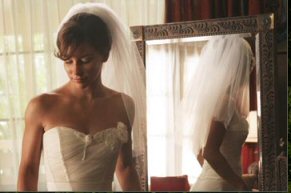As many
of you have noticed, I’ve been a little behind on
my deadlines where Lost
is concerned. The transition of emails from, “Dude,
did you watch this episode? Where is your column?”
to “Mario, seriously, it’s been 8 months, when
will we see a new Lost post?” has hardly gone unnoticed.
BTW Derek, as of this column you can officially stop harassing
me for these with daily reminders (read: threats).
All
kidding aside, as Derek is, after all, a kind and understanding
editor in chief, life changes do have a way of disrupting
one’s regular routines, and the months preceding the
birth of my daughter detonated like the purple lights emitted
from an imploding Swan Dharma station. So in short, my sincerest
apologies for the delay, but I see this as an opportunity
to reboot this column with a newfound focus on deconstructing
Lost episodes.
So,
to get into the swing of things, let’s fold time-space
and travel by tesseract back to last fall’s mid-season
finale, "I Do." The setup: The Kate, Jack, and
Sawyer story arc is drawing to a close as Sawyer’s
life is put on the line by the Others in an attempt to press
Jack to operate on Ben.
While
island politics, specifically those involving Kate, Jack,
and Sawyer, appeared to be the primary focal point of the
6-episode fall season, looking back I find that there may
be more to those episodes than what was initially perceived.
For one, Lost producers Damon Lindelof and Carlton
Cuse teased fans that the first 6 episodes were requisite
to get everyone in place for what was to come in the second
half of season 3. What they also alluded to was the introduction
of some information needed to set the stage for revealing
the bigger Lost story.
At first,
this seemed to allude to our current cast of Losties and
Others, but now I’m not so sure. After all, "I
Do" is the first mention of Jacob – a name many
of us have been bandying about in theory after theory following
the May season 3 finale. In fact, the mid-season finale
and the May season finale bookend nicely, that is if you
squint your eyes to focus primarily on Jacob.
The first mention
of our mysterious Jacob comes from the soon-to-be toast
Pickett, who has serious problems with Ben’s decision
to place his life in the hands of Jack. He retorts, “Shepherd
wasn't even on Jacob's list.”
So we learn that
whoever this Jacob is, he’s obviously the one behind
the Others’ lists of worthy characters. What these
lists mean still remains unknown, but it is as good an introduction
as any in the Lost-verse – simply put, it raises a
lot of questions.
Let’s
get to know Jacob biblically, since Lost so loves
the biblical references, and a name like Jacob is so biblically
loaded.
Jacob
and his twin brother Esau were born to Isaac and Rebekah,
and both experienced parental drama in true Lost-fashion,
as Esau was his father’s favorite and Jacob was the
jewel of his mother’s eye. Esau was firstborn, with
his brother Jacob grasping his ankle. This entitled Esau,
a hunter, to his familial birthright, but when the time
came for Isaac to bless him, Rebekah crafted a plan to have
the more studious and reserved Jacob appear before a blinded
Isaac in Esau’s place – effectively stealing
his brother’s birthright.
So, could our
Jacob be a Bad Twin? Better yet, did anyone actually read
that book? If so, weigh in and give us a full report in
the forums.
At one point
in Jacob’s story, he has vision of a ladder ascending
to heaven. From his vantage point, he watches as several
members of different tribes attempt to climb the ladder,
only to fall off. Could our Jacob be witness to similar
judgments, hence the lists he offers his followers?
Another interesting
tie comes from two of Jacob’s sons – Joseph
and Benjamin. Joseph grew up to experience visions of the
future, which helped him assist the king of Egypt and eventually
come into his favor. Who else do we know with helpful visions?
Benjamin eventually founded and led the Tribe of Benjamin
– a tribe with its own sordid past involving slaughter
and repopulation.
While
"I Do" baited us with steamy sex between Kate
and Sawyer (they do it in a cage with Jack watching via
security cam for crying out loud) and ends climactically
with Jack’s indecent proposal (cutting into Ben and
threatening not to save him as a power play to free Kate
and Sawyer), the closing island scene ties everything together
with our Jacob bible connection. While burying Mr. Eko,
Locke takes note of two scriptures carved into Eko’s
staff:
- Lift your eyes
and look north.
- John 3:05
This passage
and this scripture appear as a message to Locke, but what
do they mean? If they are intended to direct Locke to Jacob’s
whereabouts, then chalk it up as yet another biblical tie
to Jacob.
While
all of this is interesting exploration, it’s important
to remember that the writers could be toying with us along
the way; however, all of this seems too well designed to
serve merely as a ruse.
Join
me next week as Lost…in Deconstruction takes a look
at some of the finer points of the mid-season opener, "Not
in Portland." In the meantime, drop me a line with
questions, feedback, or suggestions.








